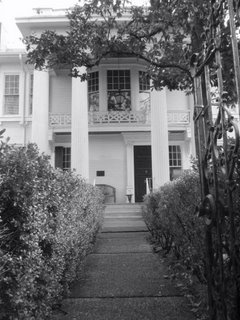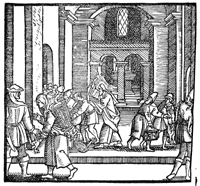St. Thomas Aquinas on Prudentia
The following is a paper I wrote for Moral Philosophy; this is the longer version, actually, the one that I turned in was trimmed down.}
St. Thomas Aquinas regarded the discipline of moral philosophy as one of great importance, recommending that the student turn his attention to it before the study of metaphysics. This should not suggest that his moral philosophy and account of the virtues are simple- for here as elsewhere he seems to have little use for Ockham’s Razor. However, as the strands of Aquinas’s thought are unwoven, one finds that they form a cognizant whole, one carefully and thoughtfully developed and presented. When considering virtue in Aquinas, the structure that surrounds it must also be considered.
In St. Thomas Aquinas’s moral philosophy the virtues have a prominent place, within the framework of his understanding of the human person as a moral agent, whose specifically human acts, properly stated, are moral acts. Aquinas presents a view of man as a moral, rational, willing agent, whose primary disposition is to seek goodness, as presented to him by his intellect (meaning that the intellect can err in its definition of goodness and take something that is evil to be good, and vice versa) and chosen by the will. The virtues are the operative habits, or dispositions, that order the complex of intellect and will in the soul toward making proper choices and hence actions for the good: “Now virtue causes an ordered operation. Therefore virtue itself is an ordered disposition of the soul.”
The virtue of prudentia- variously translated prudence, wisdom, or good sense- is given by Aquinas special place in his account of the virtues and human acts. Prudentia is perhaps best translated “good sense,” as suggested by McCabe, but even that term does not quite capture the full meaning it holds for Aquinas. In order to retain this sense of the word’s greater meaning I have opted to leave it untranslated. In order to understand the concept of prudentia in Aquinas’s overall scheme of moral philosophy, we must first examine his understanding of the will and intellect, the structure of human acts, and the essence of the virtues, taking note of prudentia’s bearing and importance in each of these elements. Finally the specific nature of prudentia itself and its overall place in the frame of moral philosophy must be considered.
Intellect, Will, and Act
Intellect and will are two closely connected powers of the soul; Aquinas sometimes speaks of the will as being in the intellect, for example, and his concept of human freedom of will is developed in a system of intellect-will interaction. Thus, the will does not operate as an independent entity but only in conjunction with the intellect, which presents to the will a good to be sought; this good functions as an end, allowing Aquinas to say: “For this reason the intellect is said to move the will not as an efficient cause but as a final cause.” The will is the principle of appetite, of desire; the intellect presents it with an “intellectively cognized appetible,” the good to be sought, which the will then acts upon once it has accepted it.
This does not mean, however, that the will must always automatically choose the single good examined by the intellect. Only in two cases, where the intellectively cognized appetible is irresistible, is the will absolutely determined by the intellect. The first of these is happiness, which the will always seeks (though obviously under many different conceptions!). The only other absolutely constraining good is the vision of God, which, once it is achieved in its perfection, can never be rejected (the impossibility of the rejection of the good in those enjoying the divine vision is due to their absolute clear view of the good, and hence the impossibility of mistaking anything else for it).
Aquinas notes, “The root of liberty is the will as the subject thereof; but it is the reason as its cause. For the will can tend freely towards various objects, precisely because the reason can have various perceptions of good. Hence philosophers define the free-will as being ‘a free judgment arising from reason,’ implying that reason is the root of liberty.” Thus while the intellect, or reason, is the “root of liberty,” it can have “various perceptions of good” between which the will must choose, or decide to consider the good presented further; it may choose not to think about the thing at hand at all, or in some other way move the intellect. “A man considers something actually because he wills to do so.” Will and reason, as previously noted, form a whole; neither are autonomous powers: “Command is an act of the reason presupposing, however, an act of the will…. The reason reasons about willing, and the will wills to reason, the result is that the act of the reason precedes the act of the will, and conversely.”
The will’s reasoned capacity (Aquinas also refers to it as intellective appetite) of choosing between different goods presented by the intellect is most evident in his description of the stages of a human act. After the will, presented with an appetible good by the intellect, has chosen it is an end, it decides to act upon it. In order to do so it must often choose (electio) between competing means of achieving the end; the will examines each presented means and accepts one of them, which it then employs through commanding the act, whether external or internal. Electio, and all acts of will, depend upon cognized internal principles contained within the intellect (virtue being a possible “principle of action”). Prudentia is particularly important in the choosing of the different means to the desired end; in fact, as we shall see, the concern of prudentia is with these means as opposed to the ascertaining of ends. But first let us consider the idea of virtue and its place in this apparatus of human intellect and will.
The Definition and Essence of Virtue
“A human virtue is any habit perfecting a human being so that it acts well.” This is one of the definitions Aquinas offers of virtue; in his defining virtue he ultimately offers a synthesis of the Aristotelian definition and the Augustinian, with the Augustinian definition becoming the center under which Aristotle’s account is placed and interpreted. Aristotle offered this definition of virtue: “Moral virtue is a habit of choosing the mean appointed by reason as a prudent man should appoint it”; he also defined virtue as “that which makes its possessor good, and his work good likewise.”
The Augustinian understanding of virtue was summed up in the following excerpt from Peter Lombard’s Sentences: “Virtue is a good quality of mind, by which one lives rightly and which no one uses badly, that God alone works in man.” In some aspects Aristotle and Augustine agree, but in several they diverge strikingly. The statement that virtue is a “good quality” Aquinas modifies by rendering the word “good” analogically, “because by it [virtue] something is good.” Regarding the matter of God’s place and hence the idea of infused virtue- that which “God alone works in man”- they are particularly divergent; Aristotle clearly has no such conception. Aquinas resolves this dilemma by establishing all of the virtues around the theological, or infused, virtues, which are specially granted by God to man, and by which all virtues, and hence human action, guided by prudentia, are oriented towards God. Aquinas upholds the infused virtues and the role of God’s causation in all of the virtues: “Infused virtue is caused in us by God without any action on our part, but not without our consent… As to those things that are done by us, God causes them in us, yet not without action on our part, for He works in every will and in every nature.”
The virtue that leads the direction and orientation to all of the virtues and hence gives their unity is prudentia: “Right reason in matters of prudence is included in the definition of moral virtue, not as part of its essence, but as something belonging by way of participation to all the moral virtues, in so far as they are all under the direction of prudence.”
Virtue in the Intellect and Will
The virtues operate through the powers of the soul: “all operation proceeds from the soul through a power.” But which powers? Aquinas distinguishes between the different powers of the soul, and contends that a virtue cannot be in two powers at once, in the same way. He qualifies by saying that a virtue, while resting in one power primarily, can extend to others “by a kind of diffusion… in so far as one power is moved by another.” A virtue may exist in the will, which then employs the other powers by moving them to meet the necessary end by the chosen means. Prudentia is again seen to be a special case, having the reason or intellect as subject yet being primarily concerned with the appetite, that is, the will.
In fact, Aquinas contends that while the virtues of the intellect can properly be called virtues, they are not virtues absolutely. These virtues consist in an “aptness” for doing something or a type of knowledge; they are the sciences and arts (art being “right reason about certain works to be made”), the virtues of the intellect being further divided into those of the speculative intellect and the practical intellect. While being operative habits of the mind (operative even in the case of the speculative intellect, which must consider truth, an operation, even if it does not employ it) and hence properly virtues, they cannot be regarded as absolute virtues. Aquinas points out that while we may speak of a good blacksmith or a good writer, for example, we do not mean anything specifically moral by it, except in an analogical sense. These individuals have a certain capacity (facultus), which they may or may not use well (or may choose not to use at all); but considered in itself a virtue such as the art of blacksmithing and writing is a good analogically, and is not a virtue absolutely.
Aquinas makes two exceptions to this general rule: faith, whose subject is the speculative intellect, and prudentia, whose subject is the practical intellect. These are virtues absolutely, alongside the other moral virtues whose subject lies in the will. Aquinas affirms that the will is a proper subject of virtues, namely, “those which direct man’s affections to God or his neighbor”; hence the virtues of the will are virtues in the absolute sense, because they are habits whose inclination is to action. Prudentia, despite coming under the practical intellect, is also a virtue absolutely because its inclination is to action, namely, the selection of appropriate means to be done in accordance with reaching a certain end.
Prudentia
Aquinas begins his discussion of prudentia by asking whether it can be distinguished from the virtue of art. Yes, it can, he says, because art provides the ability, whereas prudentia confers not only the ability, but also the use to do a good work. For prudentia, though it is, as noted above, a virtue of the intellect, “regards the appetite, since it presupposes the rectitude of the appetite.” What does this mean? Aquinas compares prudentia to the virtues of the speculative intellect. They operate from certain principles, employing reason to argue from these principles (perceived through the virtue of understanding) to its conclusions. Prudentia, on the other hand, concerns itself with ends, which are provided by the appetite. For prudentia to function properly the will must be righteous; it must be set upon the right ends: “It is requisite for prudence, which is right reason about things to be done, that man be well disposed with regard to ends; and this depends on the rectitude of his appetite.” And prudentia absolutely considered regards man’s entire life, as it deals with man’s final end.
It does not, as Aquinas makes clear, concern itself with apprehending that end, or any end; “It is requisite… that man be well disposed with regard to means.” The will comes to intend an end (intentio finis) upon being attracted to a good cognized by the intellect. Once the will is set upon an end it can then employs prudentia in reasoning well over the means to achieve that end.
Is prudentia really necessary for life? Certainly, says Aquinas: for we may possess a good end and be inclined to it, but unless we are able to employ right reason to achieve that end, it does us no good. A man may have, say, justice, and thus desire the good of his neighbor, but unless he is guided by prudentia, and takes counsel of its reason, he may arrive at disastrous ends in trying to do good for his neighbor. Prudentia is proper reason- good sense- about how to achieve the ends desired by the will. It is necessary because of the will’s freedom, for, as noted above, the will is not bound absolutely to pursue any single good, save that of happiness and the perfected vision of God. Nor is it usually bound to pursue any single means (unless only one means to the end exists). Thus prudentia may be found to operate in a very wide sphere, once it is oriented towards man’s final end. Unlike theoretical reasoning, which involves things that are as they must be, the practical reasoning of prudentia concerns contingent things, ends with many possible means of attaining them.
Ultimately we find that prudentia guides us in seeking the final end of life, which lies in God. Once the intellect has apprehended the proper end of man, prudentia directs the virtues of the will in reaching it. It brings all of the virtues together, giving the unity necessary for virtue to be regarded in some way as one, and orients them towards God, together with the infused, theological virtues. This we may regard as the “grand” position of prudentia; but it is just as much concerned with the “ordinary” decisions to be made in every-day life (though of course Aquinas would caution us that nothing is to be separated from our ultimate end), and thus requires us to be aware of things, to use our sensory facilities well in conjunction with good reason. It is, as its definition would suggest, an imminently practical virtue, one essential to living a virtuous life- which, Aquinas would also assure us, is the only sort of life worth living.
{Note that in my actual paper I employ copious footnotes; but I've no idea how to create footnotes on Blogger. The following bibliography must suffice.}
Aquinas, St. Thomas. Basic Writings of St. Thomas Aquinas, ed. Anton C. Pegis.
New York: Random House, 1945.
Jordan, Mark D. “Theology and Philosophy.” In The Cambridge Companion to
Aquinas, ed. Norman Kretzmann and Eleonore Stump. Cambridge: Cambridge University Press, 1993.
McCabe, Herbert. “Aquinas on Good Sense.” In Thomas Aquinas: Contemporary
Philosophical Perspectives, ed. Brian Davies. Oxford: Oxford University Press, 2002.
McInerny, Ralph. “Ethics.” In The Cambridge Companion to Aquinas, ed.
Norman Kretzmann and Eleonore Stump. Cambridge: Cambridge University Press, 1993.
Stump, Eleonore. “Aquinas’s Account of Freedom.” In Thomas Aquinas:
Contemporary Philosophical Perspectives, ed. Brian Davies. Oxford: Oxford University Press, 2002.
















 One of the things that is always somewhat unsettling when I read the Gospels is Jesus' frequent admonition to 'sell all you have and give to the poor'; the most memorable example I suppose would be the story of the rich young man. But all through the Gospels Jesus confronts those with wealth, and tells them troubling things like 'sell all you have,' 'how hard it is for the rich to enter the kingdom of heaven!' and the like. And if He does not bid something as drastic as selling all one has, then He says things just as condemnatory towards attachment to wealth, and gives the distinct impression that if it is possible to possess wealth and still be good, it is a difficult thing. For the pleasures of wealth and the dangerous attachment that wealth breeds in our hearts is deeply ensnaring. We are told to give to those who have no cloak and who have nothing to eat, if it is in our power to do so. Thus there is a two-fold force to Jesus' teaching on money: wealth is dangerous because it can lead to attachment exclusive of God and His Kingdom; and we are to use what wealth we have to help the poor, the hungry, the sick.
One of the things that is always somewhat unsettling when I read the Gospels is Jesus' frequent admonition to 'sell all you have and give to the poor'; the most memorable example I suppose would be the story of the rich young man. But all through the Gospels Jesus confronts those with wealth, and tells them troubling things like 'sell all you have,' 'how hard it is for the rich to enter the kingdom of heaven!' and the like. And if He does not bid something as drastic as selling all one has, then He says things just as condemnatory towards attachment to wealth, and gives the distinct impression that if it is possible to possess wealth and still be good, it is a difficult thing. For the pleasures of wealth and the dangerous attachment that wealth breeds in our hearts is deeply ensnaring. We are told to give to those who have no cloak and who have nothing to eat, if it is in our power to do so. Thus there is a two-fold force to Jesus' teaching on money: wealth is dangerous because it can lead to attachment exclusive of God and His Kingdom; and we are to use what wealth we have to help the poor, the hungry, the sick.

